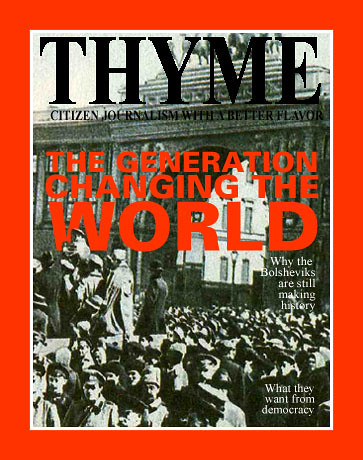
Volume III, Issue VIII
Ten Days that Shook the World
The 'other' Weekly News Magazine [click to read] is calling the young revolutionaries in Egypt 'the Generation that is Changing the World.' The more things change, the more they stay the same.
Back when Russia last had a real Tsar, Nicholas II, to be exact, a lot of his political enemies were in exile. The year was 1917 and Russia was at war with Germany.
In February of that year, Nicholas II abdicated his throne. The war was going badly and people in Petrograd [St. Petersburg] were starving. A provisional government consisting of a coalition of conservative, moderate, and liberal socialists came into power. Aleksandr F. Kerensky, the minister of justice, was an important figure in the Provisional Government.
One of the first actions of the provisional government was to free the political prisoners. Vladimir Ilich Lenin returned from exile. The stage was being set for the October Revolution. On October 24 and 25, 1917, pro-Bolshevik soldiers, sailors, and Red Guards stormed the Winter Palace and arrested members of the Provisional Government. A period of civil war followed this 'bloodless coup' that placed the Bolsheviks in power.
Many who sought legitimate reform were swept away and the Soviet State came in to being. Reform was soon lost in a new form of repression that would last for decades.
The same pattern was to repeat itself in every hemisphere of the world. The best and brightest young minds would be recruited to press for change. They would eagerly join the movement and flood the squares.
When the new regime came into power, however, they would often find themselves the object of surpression by the government they had fought to install.
Workers' Strikes in Wisconsin
Today the public sector employees of Wisconsin are striking to protect their collective bargaining priviledges. The language of this upheaval is disturbingly familiar. The state's economy is in deep trouble but the workers are resisting a move to have them contribute to their own pension plans. Resisting this reasonable reform creates an unsustainable situation where the state will not be able to pay out what it is obligated to.
At that point there will be no choice but to cut as much spending as possible and cut positions. The benefits will then become an albatross around the public employees' necks.
The path from revolution to wreckage is wide and well paved.
Another Path is Needed
One state that will not make the news, but is making history by making hard choices early is Virginia. The Virginia pension system is exploring the possibility of having workers contribute 5% to their plans. Virginia's current administration inherited a $6 billion deficit and in a bold stroke moved budget spending to 2006 levels.
Resisting the calls for more taxation, Virginia insead concentrated its efforts on creating a more hospitable environment for business growth. Even in this deep recession, state revenues are up 12.6% and job growth is happening. Much of the economy, building in particular, are still in trouble but the overall climate is attractive to companies looking to flee high tax states such as New York and California. That translates into a private sector that provides employment opportunities and real resources on which to build economic growth.
The pension bomb still needs to be dealt with, but the discussions in Richmond point to a future where the state will avoid going the way of those now near default. By monitoring her vital signs early, Virginia might lead a true revolution... one that need not ride the back of upheaval.
Egypt's Unborn Revolution
While a political transformation continues, an economic one has yet to begin. Egypt's Unborn Revolution [click to read] by Guy Sorman in City Journal.
"Many Westerners, watching the revolution in Egypt, are wondering whether the outcome will be true democracy. Less often asked but equally important is whether Egypt can reform its economy in ways that are necessary for democracy to thrive. As history has demonstrated in such places as Russia under Putin, Chile under Allende, and Iran under the mullahs, nations can be democracies at least in a technical sense—that is, they have elected leaders—but a democracy without a free economy has no future." -- Guy Sorman




No comments:
Post a Comment